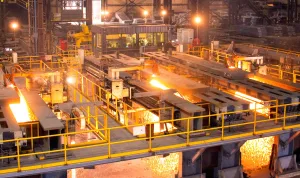Revolutionizing Steel Production: The Impact of Industry 4.0 on the Steel Industry

Revolutionizing Steel Production: The Impact of Industry 4.0 on the Steel Industry
The steel industry, a cornerstone of global infrastructure and manufacturing, is undergoing a significant transformation thanks to Industry 4.0. This fourth industrial revolution integrates cutting-edge digital technologies to optimize processes, enhance efficiency, and drive innovation. In this article, we will explore how Industry 4.0 is reshaping steel production, the benefits it brings, and the challenges that come with this digital leap.
Understanding Industry 4.0 in Steel Production
Industry 4.0 refers to the fourth industrial revolution characterized by the integration of digital technologies into manufacturing processes. For the steel industry, this involves the adoption of technologies such as the Internet of Things (IoT), artificial intelligence (AI), big data analytics, and automation.
- IoT and Smart Sensors: The deployment of IoT devices and smart sensors allows for real-time monitoring of equipment and processes. In steel production, this means enhanced tracking of temperature, pressure, and other critical parameters. Data collected from these sensors helps in predicting equipment failures, reducing downtime, and ensuring consistent product quality.
- Artificial Intelligence and Machine Learning: AI and machine learning algorithms analyze vast amounts of data to identify patterns and optimize processes. In steel manufacturing, these technologies are used for predictive maintenance, quality control, and process optimization. AI-driven insights lead to improved operational efficiency and reduced production costs.
- Big Data Analytics: Big data analytics involves analyzing large datasets to uncover insights that drive decision-making. In the steel industry, this can mean optimizing supply chain logistics, improving energy consumption, and enhancing product development. Advanced analytics enable better forecasting and more informed strategic decisions.
- Automation and Robotics: Automation and robotics play a crucial role in modernizing steel production lines. Automated systems handle repetitive tasks, increase production rates, and enhance precision. Robotics in steel manufacturing can improve safety by taking over hazardous tasks and ensure higher quality standards through consistent execution.
- Benefits of Digital Transformation in Steel Production
- Increased Efficiency: Industry 4.0 technologies streamline production processes, reduce manual intervention, and minimize errors. This leads to higher throughput, better resource utilization, and lower production costs.
- Enhanced Quality Control: With real-time data and advanced analytics, manufacturers can detect defects and deviations from quality standards early in the production process. This ensures higher product quality and reduces waste.
- Predictive Maintenance: By analyzing data from sensors and equipment, predictive maintenance models can forecast potential failures before they occur. This reduces unexpected downtimes and extends the lifespan of machinery.
- Energy and Resource Optimization: Digital tools help in optimizing energy consumption and resource usage, leading to more sustainable practices. Reducing energy waste not only cuts costs but also helps in meeting environmental regulations and sustainability goals.
- Improved Safety: Automation and robotics reduce the need for human intervention in dangerous environments. This minimizes the risk of accidents and improves overall workplace safety.
Challenges in Adopting Industry 4.0
- High Initial Investment: Implementing Industry 4.0 technologies requires significant capital investment in new equipment, software, and infrastructure. Smaller steel producers might find this cost prohibitive.
- Integration with Legacy Systems: Many steel plants still use older, legacy systems. Integrating new digital technologies with these existing systems can be complex and requires careful planning.
- Data Security Concerns: The increased use of digital technologies raises concerns about data security. Protecting sensitive production data from cyber threats is crucial.
- Skill Gaps: There is a need for skilled workers who can manage and operate advanced technologies. Training and upskilling the workforce are essential for successful digital transformation.
- Change Management: Adopting new technologies involves changes in processes and workflows. Managing this transition effectively and ensuring buy-in from all stakeholders is vital for success.
Future Trends in Steel Industry 4.0
- Advanced AI Integration: The future will see deeper integration of AI in steel production, leading to more autonomous operations and enhanced decision-making capabilities.
- Blockchain for Supply Chain Transparency: Blockchain technology could revolutionize supply chain management by providing transparent and tamper-proof records of transactions and product provenance.
- Sustainable Practices: Industry 4.0 will further drive sustainability in steel production through innovations that reduce carbon footprints and promote recycling and circular economy principles.
- Digital Twins: Digital twins, virtual replicas of physical assets, will become more prevalent. They will help in simulating and optimizing production processes in real-time.
In conclusion, Industry 4.0 is set to transform the steel industry by introducing innovative technologies that enhance efficiency, quality, and sustainability. While challenges exist, the potential benefits far outweigh them, making the digital transformation journey a crucial step for future success in steel production. Embracing these changes will not only improve operational performance but also position steel manufacturers as leaders in the digital age.



